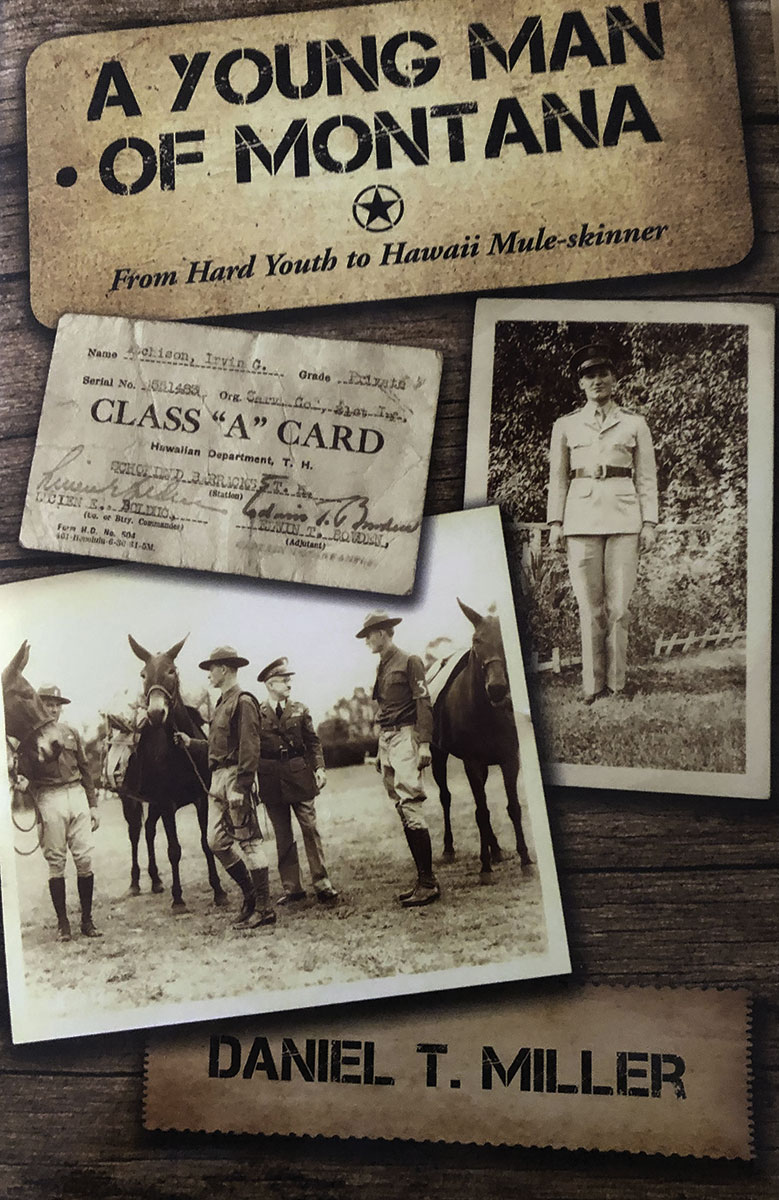Contains affiliate links
A Young Man of Montana: From Hard Youth to Hawaii Mule-Skinner, By Daniel T. Miller (Sweetgrass Books, 2021)
Review by Kathleen Mulroy
Irvin Atchison was born in eastern Montana, near the Yellowstone River, in 1914, an area that was “an oasis of cottonwoods just east of dry, open prairies and desolate badlands.” In author and historian Daniel T. Miller’s biography of Atchison, A Young Man of Montana, we learn Atchison experienced more in his first quarter-century of life than many people do in a lifetime.
After Atchison’s father died in the great flu pandemic of 1918-19, leaving his widow scrambling to provide for three young sons, Atchison spent several years shuttling back and forth between his grandparents’ home in Miles City and his family’s home near Sidney. It was a hard life for the young boy. His grandfather was an abusive alcoholic who forced Atchison to do back-breaking farm labor from dawn to dusk, while frequently yelling at and beating him.
With this kind of childhood, Atchison could easily have developed a “harsh view of life… (but) something prevented (that).” That something, Atchison told Daniel Miller, was Montana. The land where he grew up, with its enormous sky, vast prairies, and seemingly endless grasslands, lifted Atchison’s spirits in the darkest times and kept him balanced.
From an early age, Atchison gravitated toward working with the horses and mules that were so essential to farm and ranch life. In his teen years, Atchison’s abilities with equines meant that he could sometimes get extra work caring for and training them.
In 1928, when Atchison was only 14, he joined Company A, First Battalion, 163rd Regiment of the Montana National Guard. In a time of great economic distress in the United States, when, like so many, Atchison’s family was struggling financially, the boy was grateful to receive free uniforms and boots, government-funded meals, and a small stipend. Plus, he learned valuable military skills.
By the early 1930s, a terrible drought had descended on eastern Montana. “Soil turned to dust, dust rose in clouds, and the clouds blocked light from the sun…When the winds died down, the (grasshoppers and crickets) came.” More than 70,000 farmers and ranchers in Montana went bankrupt.
Atchison never stopped searching for agricultural work, usually horse and mule handling, but many landowners could not offer to pay cash; they could only exchange a bed and meals for work. He also tried the rodeo circuit with no success.
By the time Atchison graduated from high school at the age of 19, he was faced with a bleak future: there was no possibility of a steady job and no money for further schooling. Atchison decided to join the U.S. military. His timing was good because, in 1932, warfare was breaking out between Japanese and Chinese soldiers in Shanghai and Manchuria, China. U.S. Army Chief of Staff Douglas MacArthur wrote the U.S. Regular Army needed bolstering because of the “Far Eastern situation and (because of) Europe’s difficulty in agreeing on disarmament.”
Atchison and a friend “hoboed” their way on trains to San Francisco, where Atchison signed up with the Marines. He trained at Fort George Wright in Spokane, Wash. Then he shipped out of Angel Island near San Francisco as part of the 21st Infantry Regiment, to Oahu, Hawaii. Atchison’s gift with equines led to him being assigned to work with the pack mules that hauled freight for soldiers, including leading the animals on a secret mission into the Oahu mountains.
By 1935, Atchison’s deep homesickness for Big Sky Country convinced him to leave military service. After returning to his beloved state, he attended business school, married, and had children and grandchildren, and sold farm equipment. Atchison also became a respected breeder of Arabian horses, until his death in 2009. MSN
You can order this interesting biography on Amazon.com, or directly from the publisher, Sweetgrass Books (an imprint of Farcountry Press), at farcountrypress.com or (800) 821-3874.









